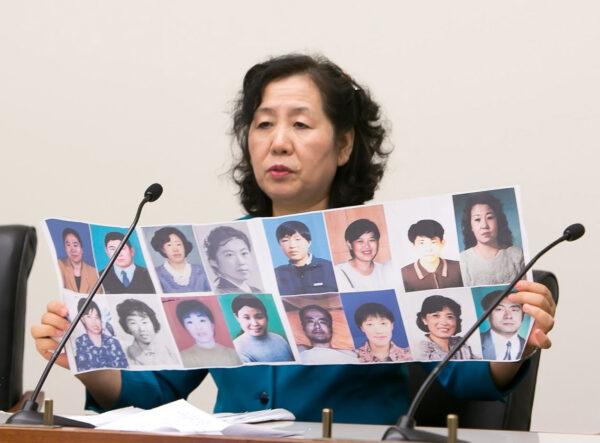FAIRFAX COUNTY, Va.—In the hallway of the Virginia General Assembly building, Wang Chunyan, a 67-year-old Chinese refugee, burst into tears and sobbed in the arms of Virginia state Del. Kaye Kory (D-Fairfax).
Calling Wang “an advocate with the courage to expose the tyranny of the Chinese Communist Party,” the resolution praised her for her contributions to Virginia and “her efforts to promote the cause of human rights and religious liberty and to encourage more people in the Commonwealth to make their own contributions to help maintain our current freedoms.”
Usually calm and collected, Wang rarely lets her emotions show in public. But it was different this time.
The persecuted Falun Gong practitioners in China came to her mind, including 20 of her own friends who lost their lives for not giving up their beliefs. “I felt I received the commendation on their behalf,” Wang told The Epoch Times, adding that she thought of the resolution as a condolence to those who had died and an endorsement of Falun Gong’s core values—truth, compassion, and tolerance—which have been under attack in China for more than two decades.
“Tears flew from my heart,” Wang told The Epoch Times. “I experienced emotions like none before in my life, as if a bottle of five flavors was knocked over in my heart.” In the Chinese idiom, the five flavors—sour, sweet, bitter, spicy, and salty—represent the different feelings in life.
“Our journey has been so difficult,” she said, referring to decades of peaceful resistance to the nationwide persecution that then-Chinese Communist Party (CCP) leader Jiang Zemin launched against the spiritual practice in July 1999. Jiang began the campaign with so much force that he didn’t expect Falun Gong to last more than three days. Yet, Falun Gong didn’t disappear in China, not even by the time he died, 20-plus years later, in November 2022.
During the Feb. 23 House session, Kory introduced Wang as “a survivor of the slave camps in communist China” and “an example of a very tough survivor with the will to help others—and not just an example of that, but an example of what we can all aspire to.”
Virginia House Speaker Todd Gilbert thanked Wang for her attendance and added, “If any of you wonder why we push back against the People’s Republic of China at the state legislative level, there’s a great example.”

‘Silent Strength’
Sixteen years ago in China, policemen at a detention center told Wang that she might die in prison if she held onto her belief, Wang recounted to The Epoch Times. She responded with a smile: “That’s all right. I will take it as a change of lifestyle.” Before her trial, she was reminded again that she could retain all her assets if she signed paperwork to give up her practice of Falun Gong. Wang refused; as a result, she was sentenced to five years in prison in August 2007.It wasn’t that she wasn’t afraid, she said. The memory of being a prisoner of conscience wasn’t in the distant past; she had suffered in prison from 2002 to 2004. Each day, she didn’t know whether she would survive the next.
During the first month of imprisonment in the Dalian Detention Center in northeast China’s Liaoning Province in 2002, three prisoners took turns beating her with a three-foot-long club made with two iron rods of about one-inch diameter twisted together. The beating lasted for about three hours, until she ran and hit her head against the wall in desperation. The torture session left her back soaked with blood. During the two years at the Liaoning Women’s Prison, she made Christmas ornaments and jackets for export.
At the same prison in 2008, she refused to do forced labor and was thrown into solitary confinement, where she suffered a heart attack and was unconscious for hours. In June 2012, two months before her jail term would be over, a lecturer from a local brainwashing center visited Wang. He said he would be waiting for her the day of her release and take her straight to his brainwashing class.
“I almost died several times in the prison and would be released soon. However, they still wanted to destroy me mentally and physically. I felt so despairing and had another heart attack,” Wang recalled. “I could not say a word, but my tears were running uncontrollably. The lecturer saw that and left me right away.” After she was released on Aug. 15, 2012, she started looking for ways to leave China. In May 2013, she managed to escape to Thailand. On her first day there, she applied for U.N. refugee status.
Ultimately, she overcame the persecution in China without denouncing her belief.

Kory told The Epoch Times: “I felt overwhelmed, but also honored that she was willing to be so authentic with me. And I know she’s been through so much. And her tears were of pain and joy.”
Kory said she thought of “silent strength” when thinking of Wang: “I think she mostly keeps her pain to herself. And the reason that she came to the General Assembly was to support the ideals that she has, not to talk about herself. That’s what I meant by silent.
“That kind of perseverance, which is relatively without ego, is very impressive.”
Wang recalled collecting those signatures in shopping malls across Virginia in the summer of 2021: “I couldn’t clearly see the path ahead and my next steps. I just thought that I could at least inform people of the facts of the persecution, which were so hard to come by in China. My path is clearer now in hindsight. So [getting the commending resolution] is, in a way, closure for me.”
She said she would continue to expose the CCP’s tyranny and help Americans see the harm of communism.




